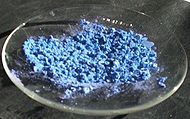| Title : Top 10 Eating Tips to Stay Energized All Day
Source : Yahoo! Food Author : Monique Ryan Date : October 15, 2008 |

Picture Source : Wikipedia.org |
Top 10 Eating Tips to Keep You Energized All Day
Excerpt:
Getting through the day can feel like a marathon. Mile 1 : Roll out of bed. Mile 2 : Feed yourself and everyone else in your house. Mile 3 : Get to work on time. It’s like you’ve run 5K, and it’s not even lunch yet! Nutritionist Monique Ryan, MS, RD, the author of Sports Nutrition for Endurance Athletes, knows the secrets to get through real marathons. I asked her to pass some advice down to us mortals who simply want to stay alert until sundown.
Click here to read full article.
Talking points
What are the ten tips the author offers for staying energized all day?
Do you agree with her suggestions? Have you tried them before?
Have you had trouble maintaining energy throughout the day?
Do you think that the food you eat can have an effect on the amount of energy you have?
What would be your suggestions for staying energized all day?
Vocabulary from this article :
Picture Source : Wikipedia.org
Word |
Definition |
Images |
|---|---|---|
| sundown | Noun: 1.sunset, especially the time of sunset.VERB:(used with object) 2.Psychiatry. to experience confusion or hallucinations at night as a result of strange surroundings, drug effects, decreased sensory input, or reduction of oxygen supply to the brain. |
 |
| alert | Noun:1.an attitude of vigilance, readiness, or caution, as before an expected attack. 2.a warning or alarm of an impending military attack, a storm, etc.:VERB:3.to warn (troops, ships, etc.) to prepare for action. 4.to warn of an impending raid, attack, storm, etc.: |
|
| hydrate(d) | Noun:1.any of a class of compounds containing chemically combined water. In the case of some hydrates, as washing soda, Na 2 CO 3 ⋅10H 2 O, the water is loosely held and is easily lost on heating; in others, as sulfuric acid, SO 3 ⋅H 2 O, or H 2 SO 4 , it is strongly held as water of constitution.VERB:(used with or without object), hy·drat·ed, hy·drat·ing. 2.to combine chemically with water. |

Picture Source : Wikipedia.org |
| sustain | Verb:(used with object)1.to support, hold, or bear up from below; bear the weight of, as a structure. 2.to bear (a burden, charge, etc.). 3.to undergo, experience, or suffer (injury, loss, etc.); endure without giving way or yielding. |

Picture Source : Wikipedia.org |
| glucose | Adjective:a sugar, C 6 H 12 O 6, having several optically different forms, the common dextrorotatory form (dextroglucose, or -glucose) occurring in many fruits, animal tissues and fluids, etc., and having a sweetness about one half that of ordinary sugar, and the rare levorotatory form (levoglucose, or -glucose) not naturally occurring. |
 Picture Source : Wikipedia.org Picture Source : Wikipedia.org |
| protein | Noun:
Biochemistry. any of numerous, highly varied organic molecules constituting a large portion of the mass of every life form and necessary in the diet of all animals and other nonphotosynthesizing organisms, composed of 20 or more amino acids linked in a genetically controlled linear sequence into one or more long polypeptide chains, the final shape and other properties of each protein being determined by the side chains of the amino acids and their chemical attachments: proteins include such specialized forms as collagen for supportive tissue, hemoglobin for transport, antibodies for immune defense, and enzymes for metabolism. |
 Picture Source : Wikipedia.org Picture Source : Wikipedia.org |
| caffeine | Noun:a white, crystalline, bitter alkaloid, C 8 H 10 N 4 O 2, usually derived from coffee or tea: used in medicine chiefly as a nervous system stimulant. |
 Picture Source : Wikipedia.org Picture Source : Wikipedia.org |
| folate | Noun: 1.folic acid. 2.a salt or ester of folic acid. |
 Picture Source : Wikipedia.org Picture Source : Wikipedia.org |
| dehydration | Noun:1.the act or process of dehydrating. 2.an abnormal loss of water from the body, especially from illness or physical exertion. |

Picture Source : Wikipedia.org |
| nutritionist | Noun:a person who is trained or expert in the science of nutrition. |
|
| carbohydrate(s) | Noun:1.any of a class of organic compounds that are polyhydroxy aldehydes or polyhydroxy ketones, or change to such substances on simple chemical transformations, as hydrolysis, oxidation, or reduction, and that form the supporting tissues of plants and are important food for animals and people. |
 Picture Source : Wikipedia.org Picture Source : Wikipedia.org |
| interfere | verb:(used without object), in·ter·fered, in·ter·fer·ing. 1.to come into opposition, as one thing with another, especially with the effect of hampering action or procedure (often followed by with): Constant distractions interfere with work. |
|
| cereal(s) | Noun:1.any plant of the grass family yielding an edible grain, as wheat, rye, oats, rice, or corn. 2.the grain itself. 3.some edible preparation of it, especially a breakfast food. adjective 4.of or relating to grain or the plants producing it. |

Picture Source : Wikipedia.org |
| mortal(s) | Adjective: 1.subject to death; having a transitory life: all mortal creatures. 2.of or relating to human beings as subject to death; human: this mortal life. |
|
| skim | verb:to take up or remove (floating matter) from the surface of a liquid, as with a spoon or ladle: to skim the cream from milk. |
